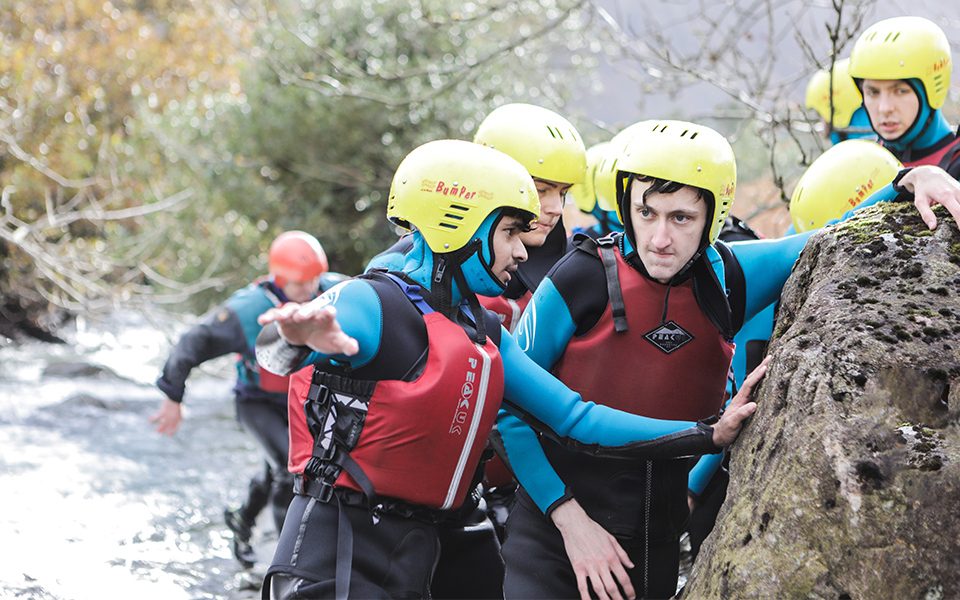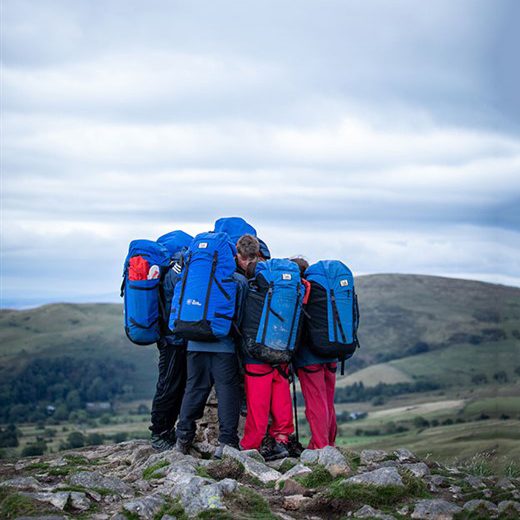How can you teach resilience?
Everyone loves resilience! Over the last decade there has been an increasing recognition that resilience is one of the most effective ways for individuals and organisations to experience sustained success. This is especially important in an increasingly unpredictable world.
What is much rarer is for a learning and development organisation to explain exactly which behaviours lead to increased resilience and what specific elements in training increase them. Outward Bound are the exception!
This blog looks at the most important behaviours that increase resilience, particularly (but not exclusively) in a workplace setting: perseverance, effort, imagination and an appropriate level of support.

Perseverance
"Perseverance, secret of all triumphs" - Victor Hugo
Perseverance is plugging away for prolonged period (not just a two hour exam) and bouncing back after initial failures. At Outward Bound we normally include day long challenges as part of a five-day programme. We use very few 30 minute ‘buzz activites’ that bring easy success but are of little relevance to the workplace. At Outward Bound success must be earned with hard work and focused thought. The length of our activities means there's time for young people to fail, to learn from their mistakes and apply what they've learnt to hopefully bring success. The training continues into the evenings where the day is reviewed and behaviours are identified. This learning is used to plan the next day.
Effort
"Quality is never an accident. It is always result of intelligent effort" - John Ruskin
Effort is about having the correct level of genuine challenge. Outward Bound adventures are authentic because they take place in nature. No one can talk, charm, or tweet their way up a mountain, across a lake or up a waterfall. Our genuine challenges can only be achieved with effort. It is about what you do (behaviours), not how you speak or look.
On Outward Bound programmes, each group has a dedicated and experienced trainer who work with them all week, continuously setting and evaluating the level of challenge. This flexible approach means each team could climb a mountain - but a different one, in a different way, with a different level of support. This is a world away from learning programmes where everyone does the same challenge in the same way. In those cases some teams cruise to success without any effort, and some groups are destined to fail no matter how hard they try. At Outward Bound significant (psychological and/or physical) effort is always required to succeed in the task.
Imagination
"Insanity is doing the same thing over and over again and expecting different results" - Albert Einstein
An essential part of resilience (one that's often overlooked) is the use of imagination to come up with new strategies when your initial idea isn't working or the situation has changed. Repeatedly plugging away with 100% effort will never bring success if the strategy is flawed. This flexible mindset is clearly fundamental to ongoing business success. And at Outward Bound, we design our challenges to require imaginative thinking to succeed. This approach aligns with our prolonged challenges where the most obvious approach may not work and repeated efforts may be needed.
Support
"Strong enough to stand alone, smart enough to know when you need help" - Dame Kelly Holmes
One of the toughest workplace challenges is to create networks that provide the appropriate level of support. Resilience is about recognising just how much you can achieve by yourself, and when it is the right time to ask for support.
Outward Bound activities require a careful balance of things which can be done individually (like crawling through a tunnel), and those which can only be done as part of a group (like paddling a raft into the wind). When it comes to developing support networks this is where the residential element is key. People can have powerful experiences on a one-day event that they discuss that evening at home with friends, family and on social media. In contrast, at Outward Bound these same discussions happen face to face with work colleagues over a shared meal and in free time. It is these natural, in person conversations which build lasting support networks.
And finally, the stress test...
The final part of the jigsaw is knowing you can pull on these behaviours even when you are stressed. Periods of stress are simply an inevitable part of work and life, and the crucial thing is how we act in these stressful situations. Outward Bound activities create (safe) levels of stress with; the weather, the hills, the cold water, tiredness, and how different the situations are from participants everyday life. If someone can display resilience halfway up a windswept mountain on a wet November day, then those behaviours are stress proofed and should ‘stick’.
Want to know more?
Join us for a FREE workshop on how to develop resilience in your early careers talent. It's a morning event, in Manchester on Wednesday 4 December.
Further Reading
FREE REPORT: MENTAL HEALTH AND RESILIENCE
Our report focuses on ways we can help young people build their resilience.
Free workshop: developing resilience
If you are responsible for developing early careers talent, it's likely you want them to be resilient. But how do you teach this?


